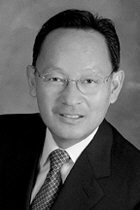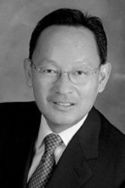California Supreme Court justice vacancy (August 2020)
| California Supreme Court |
|---|
| Chin vacancy |
| Date: August 31, 2020 |
| Status: Seat filled |
| Nomination |
| Nominee: Martin Jenkins |
| Date: Nomination: October 5, 2020 Hearing: November 10, 2020 Confirmation: November 10, 2020 |
California Gov. Gavin Newsom (D) appointed Martin Jenkins to the California Supreme Court on October 5, 2020. The state Commission on Judicial Appointments confirmed Jenkins' appointment on November 10, 2020. He succeeded Justice Ming Chin, who retired on August 31, 2020.[1][2][3] Jenkins was Newsom's first nominee to the seven-member supreme court.
At the time of the appointment under California law, state supreme court justices were recommended by the Commission on Judicial Nominee Evaluation to the governor. The governor then selected the new justice, who had to be confirmed by the state Commission on Judicial Appointments.
Ballotpedia has compiled the following resources on the process to fill the California Supreme Court vacancy.
- An overview of nominee Martin Jenkins.
- An overview of the selection process.
- Noteworthy events that occurred during the nomination process.
- Excerpts from media coverage of the nomination process.
- An overview of the court following the vacancy.
- An overview of retiring Justice Ming Chin.
- An overview of the California Supreme Court.
- A list of other state supreme court appointments in 2020.
The appointee
- See also: Martin Jenkins
Jenkins was an associate judge on the California First District Court of Appeal, Division Three, from 2008 to 2019. He was appointed by Governor Arnold Schwarzenegger (R).[4] He stepped down in 2019 after Gov. Newsom appointed Jenkins as judicial appointments secretary.[5]
From 1997 to 2008, Jenkins was a judge on the United States District Court for the Northern District of California. President Bill Clinton (D) nominated Jenkins on July 24, 1997, to a seat vacated by Eugene Lynch. The U.S. Senate confirmed Jenkins on November 9, 1997, and he received commission on November 12. Jenkins served on the Northern District of California until his resignation on April 3, 2008.[6]
Jenkins was also a judge on the Superior Court of Alameda County from 1992 to 1997 and on the Oakland-Piedmont-Emeryville Municipal Court from 1989 to 1992.[6]
Jenkins earned his A.A. from the City College of San Francisco in 1973, his B.A. from Santa Clara University (formerly the University of Santa Clara) in 1976, and his J.D. from the University of San Francisco School of Law in 1980.[6]
A press release from Gov. Newsom's office said of Jenkins, "He would be the first openly gay California Supreme Court justice and only the third African American man ever to serve on the state’s highest court. It has been 29 years since an African American man has served on the California Supreme Court."[1]
The selection process
- See also: Judicial selection in California
As of August 2020, the seven justices of the California Supreme Court were selected by gubernatorial appointment and commission confirmation.
The state bar's Commission on Judicial Nominee Evaluation (the "Jenny Commission," made up of attorneys and public members) was required to investigate prospective appointees. The commission then recommended candidates to the governor. The governor was not bound to these recommendations, but was held accountable to the Commission on Judicial Appointments, which was free to approve or veto the appointment by majority vote.[7]
Justices who wished to retain their seat for the remainder of an unexpired term had to participate in yes-no retention elections occurring at the time of the next gubernatorial race (held every four years). After the first election, subsequent retention elections were for full 12-year terms.[7][8]
Commission on Judicial Nominee Evaluation
In 1979, the California State Legislature created the Commission on Judicial Nominees Evaluation (also known as the "Jenny Commission"). The commission would review potential judicial appointees. Attorneys and public members were able to serve on the commission. Appointees received ratings of: exceptionally well-qualified, well-qualified, qualified, or not qualified. The governor was not required to consider the commission's ratings in making appointments.[9]
Commission on Judicial Appointments
As of August 2020, the California Commission on Judicial Appointments was responsible for confirming appointments the governor made to the California Supreme Court, state courts of appeal, and the California Superior Courts. The governor made a selection to fill the vacancy; the commission then held public hearings. The commission had to file a report indicating its approval of the governor's selection with the California Secretary of State before any appointment to an appellate court could be effective.[10]
As of August 2020, the commission consisted of three members: the chief justice of the state supreme court, the state attorney general, and the senior presiding justice of the court of appeal for the district to which a judge was being appointed. When the candidate was a supreme court appointee, the senior presiding justice for the court of appeal served as the third member of the commission.[10][11]
Noteworthy events
State LGTBQ caucus urges nomination of LGTBQ judge
California State Sen. Scott Wiener (D-San Francisco) and Assemblymember Todd Gloria (D-San Diego) sent a letter on behalf of the California Legislative LGBTQ caucus to Gov. Newsom, urging the governor to nominate an LGTBQ judge to succeed Justice Chin.[12]
The text of the letter read:
| |||||||
Media coverage
- Maura Dolan, Patrick Mcgreevy, Los Angeles Times (October 5, 2020): "Jenkins owes most of his judicial career to Republicans, despite his Democratic affiliation. He is viewed as generally less liberal than the four justices [Gov. Jerry Brown (D)] appointed to the state high court. ...
- The governor’s appointment of Jenkins was 'a monumental step forward for the LGBTQ+ community and for our entire state,' said Rick Chavez Zbur, executive director of the gay rights group Equality California. 'Not only is Justice Jenkins exceptionally qualified and an outstanding choice for California’s highest court, but he embodies the values of our great state.'"[14]
Makeup of the court
- See also: California Supreme Court
Following Ming's retirement, the California Supreme Court included the following members:
| ■ Carol Corrigan | Appointed by Gov. Arnold Schwarzenegger (R) in 2005 | |
| ■ Tani Cantil-Sakauye | Appointed by Gov. Schwarzenegger in 2010 | |
| ■ Goodwin Liu | Appointed by Gov. Jerry Brown (D) in 2011 | |
| ■ Mariano-Florentino Cuéllar | Appointed by Gov. Brown in 2014 | |
| ■ Leondra Kruger | Appointed by Gov. Brown in 2014 | |
| ■ Joshua Groban | Appointed by Gov. Brown in 2018 |
About Justice Chin
- See also: Ming Chin
Chin was appointed to the California Supreme Court in January 1996 by Governor Pete Wilson (R). He was retained by voters for additional 12-year terms in 1998 and 2010.[15] When he retired, Chin was the court's first Chinese-American justice and its longest-serving sitting member.[2]
A court press release said of retiring Justice Chin, "Justice Chin is the court’s first Chinese-American justice and its longest-serving sitting member. He authored over 350 majority opinions and more than 100 separate opinions during his tenure, including a landmark decision that paved the way for spousal abuse to be used as a defense in murder cases."[2]
Before becoming a state supreme court justice, Chin served on the California First District Court of Appeal (1990-1996) and the Alameda County Superior Court (1988-1990).[16]
Chin earned his undergraduate degree in political science from the University of San Francisco in 1964. He earned his J.D. from the University of San Francisco in 1967. After graduating from law school, Chin served for two years in the United States Army and another two years in the Army Reserve.[15]
Political ideology
In October 2012, political science professors Adam Bonica and Michael Woodruff of Stanford University attempted to determine the partisan ideology of state supreme court justices. They created a scoring system in which a score above 0 indicated a more conservative-leaning ideology, while scores below 0 were more liberal.
Chin received a campaign finance score of -0.97, indicating a liberal ideological leaning. This was more liberal than the average score of -0.32 that justices received in California.
The study was based on data from campaign contributions by the judges themselves, the partisan leaning of those who contributed to the judges' campaigns, or, in the absence of elections, the ideology of the appointing body (governor or legislature). This study was not a definitive label of a justice, but an academic summary of various relevant factors.[17]
California Supreme Court
- See also: California Supreme Court
Founded in 1849, the California Supreme Court is the state's court of last resort and has seven judgeships. The current chief of the court is Patricia Guerrero.
As of January 2023, six judges on the court were appointed by Democratic governors and one judge was appointed by a Republican governor.
The California Supreme Court holds regular sessions in San Francisco, Los Angeles, and Sacramento.[18]
In California, state supreme court justices are selected through direct gubernatorial appointment. Justices are appointed directly by the governor without the use of a nominating commission.[19] There are five states that use this selection method. To read more about the gubernatorial appointment of judges, click here.
Other state supreme court appointments in 2020
- See also: State supreme court vacancies, 2020
The following table lists vacancies to state supreme courts that opened in 2020. Click the link under the Court column for a particular vacancy for more information on that vacancy.
Click here for vacancies that opened in 2021.
See also
External links
Footnotes
- ↑ 1.0 1.1 Office of Governor Gavin Newsom, "Governor Newsom Selects Justice Martin Jenkins (Ret.) for California Supreme Court," October 5, 2020
- ↑ 2.0 2.1 2.2 California Courts, "Justice Ming Chin to Retire from California Supreme Court," January 15, 2020
- ↑ Courthouse News Service, "Martin Jenkins Confirmed to California’s High Court," November 10, 2020
- ↑ California Courts, "1st District Court of Appeal, Justices," accessed July 12, 2014
- ↑ University of San Francisco School of Law, "Gov. Gavin Newsom Names Martin Jenkins ’80 Judicial Appointments Secretary," January 17, 2019
- ↑ 6.0 6.1 6.2 Federal Judicial Center, "Jenkins, Martin J.," accessed October 7, 2020
- ↑ 7.0 7.1 American Judicature Society, "Methods of Judicial Selection: California," archived October 2, 2014
- ↑ California Secretary of State, "Justices of the supreme and appellate courts," accessed April 7, 2014
- ↑ www.judicialselection.com, "Methods of Judicial Selection: California," accessed December 30, 2013
- ↑ 10.0 10.1 California Courts, "Commission on Judicial Appointments," accessed April 23, 2015
- ↑ California Courts, "Commission Guidelines," accessed April 23, 2015
- ↑ The Pride, "News Brief: Calls for LGBTQ CA Supreme Court Judge," February 14, 2020
- ↑ Note: This text is quoted verbatim from the original source. Any inconsistencies are attributable to the original source.
- ↑ Los Angeles Times, "Newsom names first openly gay justice to the California Supreme Court," October 5, 2020
- ↑ 15.0 15.1 California Courts, "Associate Justice Ming W. Chin Biography," accessed April 30, 2015
- ↑ California Courts, "Associate Justice Ming W. Chin," accessed February 1, 2019
- ↑ Stanford University, "State Supreme Court Ideology and 'New Style' Judicial Campaigns," October 31, 2012
- ↑ Courts Newsroom, "California Supreme Court," accessed August 17, 2021
- ↑ Note: In New Hampshire, a judicial selection commission has been established by executive order. The commission's recommendations are not binding.
| ||||||||||||||||||||||||||||||||||||||
Federal courts:
Ninth Circuit Court of Appeals • U.S. District Court: Central District of California, Eastern District of California, Northern District of California, Southern District of California • U.S. Bankruptcy Court: Central District of California, Eastern District of California, Northern District of California, Southern District of California
State courts:
California Supreme Court • California Courts of Appeal • California Superior Courts
State resources:
Courts in California • California judicial elections • Judicial selection in California
| |||||||









